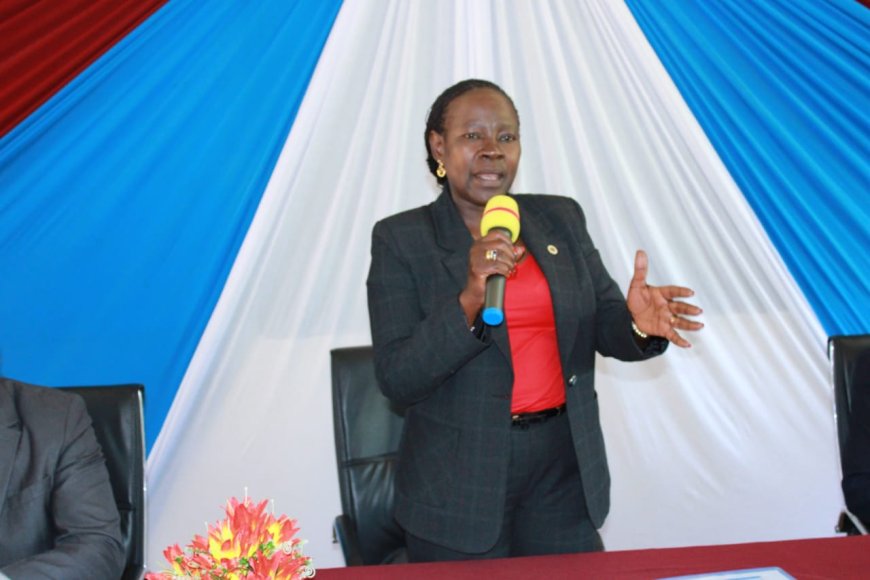Stakeholders to Harmonize Education Standards

Nairobi,
Monday, October 9, 2023
KNA by Hamdi M. Buthul
Education stakeholders in Africa are working on modalities to harmonize the continent’s education standards with emerging challenges in the labour market.
The Cabinet Secretary for Education, Mr. Ezekiel Machogu said the pivotal role of Africa in the evolution of labor markets and education systems, calls for responsive policies that promote lifelong learning and empower individuals to acquire the skills and qualifications needed for success.
“This will enable Africa to contribute to a more inclusive future where the workforce is agile, resilient, and ready to face the challenges and opportunities of tomorrow,” said Machogu.
He commended the commitment of various governments to develop responsive and effective frameworks that contribute to Sustainable Development Goals and support skills revolution, social inclusion, and enhanced employability for all segments of the population.
The CS made the remarks in a speech read on his behalf by the Principal Secretary State Department for Technical and Vocational Training (TVET), Dr. Esther Muoria during the African Continental Qualifications Framework (ACQF) –II Training Workshop held at a Nairobi hotel.
The theme of the three-day training workshop is ‘Making National Qualifications Frameworks Operational in a Changing World’.Machogu, said he is impressed with the commencement of the groundbreaking training program that highlights the importance of the current educational landscape, especially in light of the ongoing global changes in qualifications frameworks.
“A nation that invests in policies aimed at enhancing the credibility and alignment of qualifications with emerging global trends is a forward-thinking nation,” he emphasized.
The CS noted that the transformative nature of qualifications, which have been significantly influenced by global megatrends such as digitalization, automation, demographic shifts, climate change and the Covid-19 pandemic have reshaped the relationship between education systems and the labor market.
He further stressed the importance of adapting to the rapid pace of technological advancement since reskilling and upskilling requires a flexible approach that enables the acquiring of credentials for lifelong learning.
Machogu emphasized the need to bridge the gap between education and work, underpinned by high-quality and trusted qualifications recognized at all levels.
The Acting Director General of Kenya National Qualifications Authority, Dr. Alice Kande, highlighted the complexity of the modern world, emphasizing the need for continuous adaptation to technological advancements and economic shifts.
Dr. Kande, stressed the pivotal role qualifications frameworks play in shaping the quality and relevance of education in respective nations.
The KNQF, she noted, stands as a beacon of educational enlightenment in Kenya, offering structured pathways for learners, professionals, and institutions to keep pace with change.
She said KNQF represents a structured journey of personal and professional development, with levels not mere labels but operational rungs guiding individuals towards their goals.
Dr. Kande urged African nations to develop their own National Qualifications Frameworks (NQFs), that underscore their role in advancing education, fostering regional collaboration, and enhancing global competitiveness.
Drawing from experiences of countries like Kenya and South Africa, she emphasized the need for meaningful dialogue, best practice exchange, and addressing challenges in the pursuit of transparent qualifications and mutual trust for lifelong learning in Africa.
The evolving nature of NQFs was not overlooked, with Dr. Kande highlighting their increasing engagement with digitalization.
She stressed that learning in all contexts matters more than ever, especially as the world undergoes transformations in work, technology, and the economy, noting that effective NQFs are key to achieving SDG-4 in areas of inclusive and equitable quality education and SDG-8 on decent work and economic growth while contributing to wider objectives of skills revolution, social inclusion, and improved employability.
The ACQF-II Training Workshop is set to be a crucible for forging a path towards a more harmonized, transparent, and effective education system across Africa whose efforts are poised to resonate for years to come.
Courtesy; KNA
What's Your Reaction?
































































































































































































































































































